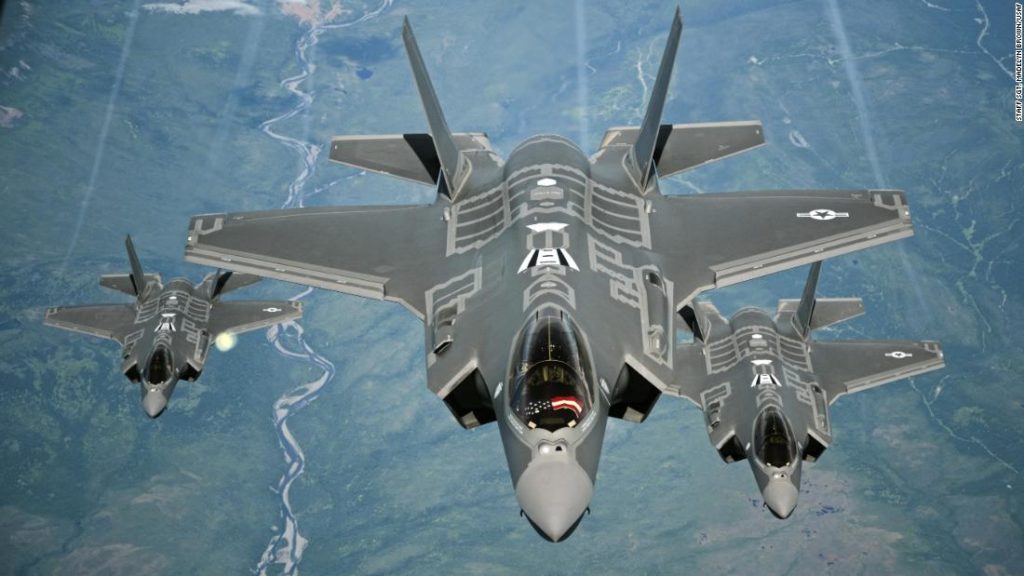The $5.5 billion deal adds a 15th nation to the world’s largest weapons project — a family of interconnected, single-engine jets to be used by the United States and its allies and partners.
It came alongside a $2.1 billion agreement to buy the Patriot surface-to-air missile system from US group Raytheon, with European competitors losing out on both deals.
The F-35 has faced multiple budget overruns, delays and technical setbacks, but is building export momentum. Critics say the project, valued at trillions of dollars over its lifetime, has seen costs soar while failing to meet goals on capability.
Neutral Switzerland will buy 36 F-35As after an evaluation found it had “the highest overall benefit at the lowest overall cost,” the government said.
The aircraft beat bids from Boeing’s F/A-18 Super Hornet, the Rafale from France’s Dassault and the four-nation Eurofighter built by Germany- and Spain-backed Airbus, Italy’s Leonardo and Britain’s BAE Systems.
The decision drew immediate criticism from anti-armaments campaigners and left-wing parties who will now launch a campaign for a referendum on the issue, the third Swiss vote on buying fighter jets.
Voters seven years ago rejected the purchase of Gripen jets from Sweden’s Saab, while the 6 billion Swiss franc ($6.5 billion) funding, which led to the decision to buy the F-35As, was only narrowly approved last year.
Opponents say Switzerland doesn’t need cutting-edge warplanes to defend its Alpine territory, which a supersonic jet can cross in 10 minutes.
“The decision is simply incomprehensible,” said Priska Seiler Graf, a member of Parliament for the left-leaning Social Democrats (SP), who has raised concerns about the cost.
“It’s not just about buying them, but the upkeep and operating costs,” she added. “We should seek a European solution … we don’t want to be dependent on the United States.”
The government picked the Patriot missile system over Franco-Italian group Eurosam.
Defense Minister Viola Amherd said the F-35As were chosen after being the most impressive performer in an evaluation and offered best value for money.
Total costs of 15.5 billion francs ($16.7 billion) came in 2 billion francs cheaper than the next lowest bidder, the government said, based on buying and operating the aircraft over 30 years.
“We would not have bought a Ferrari if a VW would do and the Ferrari would be three times more expensive,” Amherd told a news conference.
The Swiss Parliament now has to approve the funding for the purchase, with the debate scheduled for early next year. It can debate costs and terms but not revisit the model selection.
The fighter decision was closely watched as the first of three face-offs ahead of Finland and Canada.
Lockheed’s stealthy fifth-generation fighter recently added Poland to its list of European customers which includes Belgium, Denmark, Italy, the Netherlands, Norway, and Britain.
US President Joe Biden had lobbied for American companies when meeting his Swiss counterpart while in Geneva for his summit with Russian President Vladimir Putin this month.
Analysts said the decision to snub both the European fighter jet candidates and surface-to-air missile offering could be seen as a Swiss rebuff to the European Union in a time of strained relations between Bern and Brussels after the collapse of talks over a new agreement governing trade and other matters.
By doubling down on US suppliers the government could antagonize the 49.8% of voters who opposed funding last year.
Anti-arms campaigners say Switzerland, which last fought a foreign war more than 200 years ago and has no discernable enemies, does not need cutting-edge fighters.
But supporters have said Switzerland needs to be able to protect itself without relying on others.
Jonas Kampus, political secretary of the Group for a Switzerland without an Army, said he was confident of winning a referendum against the F-35As.
The government “can expect a heavy defeat in the vote. The follow-up polls in September (2020) showed a clear rejection of the F-35 among the voting population,” he said.
Marionna Schlatter, a lawmaker with the Greens Party said the September poll was too close to ignore opposition concerns.
“The people don’t want a Ferrari in the air,” she said.
You may also like
-
Afghanistan: Civilian casualties hit record high amid US withdrawal, UN says
-
How Taiwan is trying to defend against a cyber ‘World War III’
-
Pandemic travel news this week: Quarantine escapes and airplane disguises
-
Why would anyone trust Brexit Britain again?
-
Black fungus: A second crisis is killing survivors of India’s worst Covid wave

